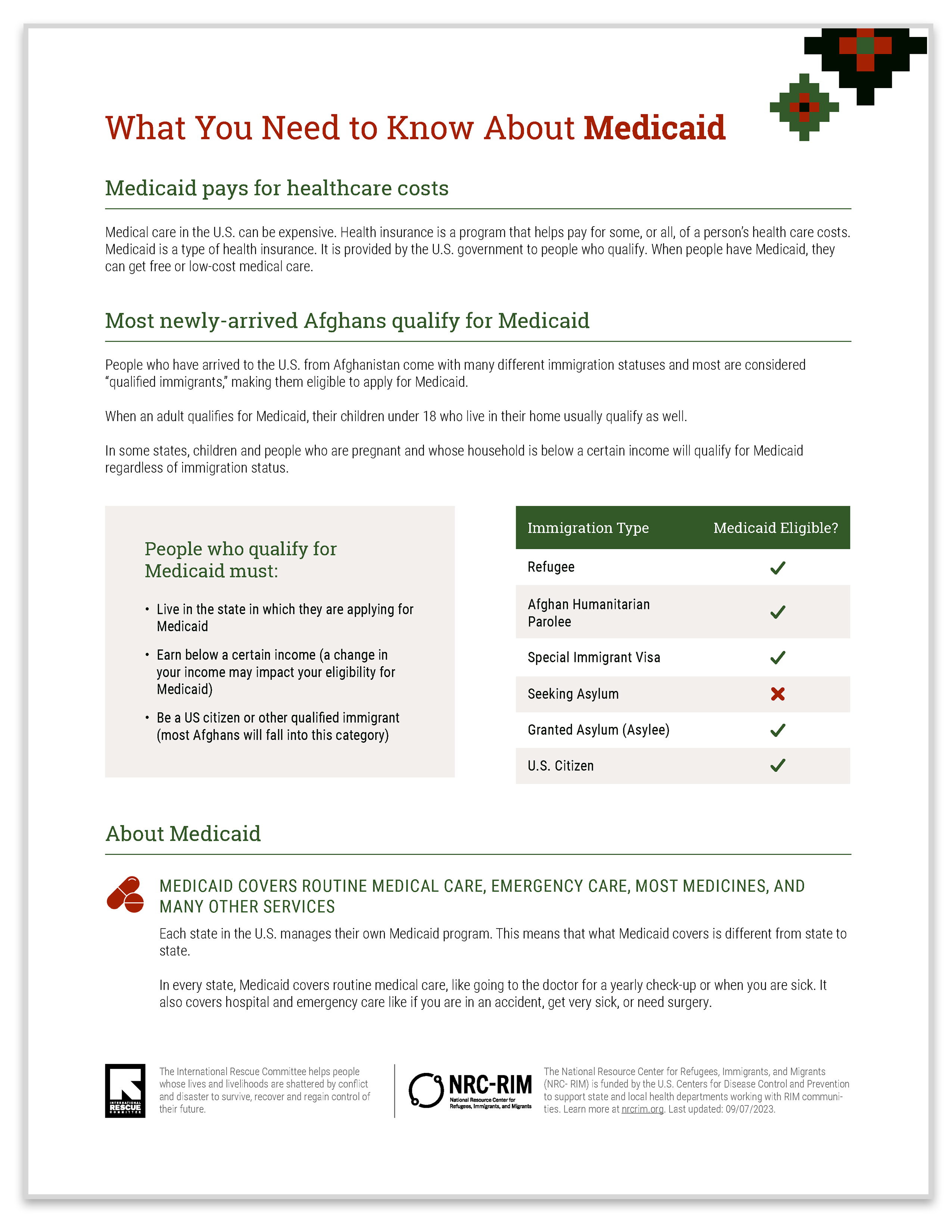
Medicaid is the biggest health care program in the country. It’s an important part of the United States health care system and allows for free or low-cost medical care. A lot of the information about Medicaid and healthcare coverage can be difficult to understand and navigate. NRC-RIM along with our partners at International Rescue Committee created this conversation guide as a resource to help guide Afghan and Ukrainian newcomers understand Medicaid and its benefits.
Update: Most Afghans who receive humanitarian parole in the US on or after October 1, 2023 are not eligible for ORR or federal mainstream benefits. This includes Medicaid, SNAP (food stamps), or TANF (Temporary Assistance for Needy Families). Keep this in mind when sharing this information with clients.
What is Medicaid?
Medicaid is a public insurance program that provides health coverage to low-income families and individuals, including children, parents, pregnant women, seniors, and people with disabilities. Each state operates its own Medicaid program within federal guidelines.
How do I know if I qualify for Medicaid?
For newly arrived Afghans who are Refugees, Afghan Humanitarian Parolee, Special Immigrant Visa, Granted Asylum (Asylee) and U.S. Citizen are eligible for Medicaid.
People who have arrived to the U.S. from Afghanistan come with many different immigration statuses and most are considered “qualified immigrants,” making them eligible to apply for Medicaid.
In some states, children and people who are pregnant and whose household is below a certain income will qualify for Medicaid regardless of immigration status.
What are the requirements for Medicaid?
People who qualify for Medicaid must:
- Live in the state in which they are applying for Medicaid
- Earn below a certain income (a change in your income may impact your eligibility for Medicaid)
- Be a US citizen or other qualified immigrant (most Afghans will fall into this category)
What does Medicaid Cover?
Medicaid Covers Routine Medical Care, Emergency Care, Most Medicines and Many Other Services.
Each state in the U.S. manages their own Medicaid program. This means that what Medicaid covers is different from state to state.
In every state, Medicaid covers routine medical care, like going to the doctor for a yearly check-up or when you are sick. It also covers hospital and emergency care like if you are in an accident, get very sick, or need surgery.
Medicaid also covers most medicines a doctor prescribes. When Medicaid does not cover a certain medicine, the patient can ask the doctor to prescribe them a medication that Medicaid will cover.
Medicaid coverage for dental care, eye care, and medical supplies will be different from state to state.
How can I apply for Medicaid?
If you have a caseworker at a Resettlement Agency, they can help you apply for Medicaid.
Afghans who have recently arrived to the U.S. can also reach out to the Virtual Resettlement Line (VRL) to receive information and referrals to local community organizations who may be able to help. Eligible Afghans may also be connected to a local resettlement agency for support, depending on their needs. Call +1 (212) 551 - 3010 or email VRL@rescue.org to get connected.
You can also contact your local Medicaid agency to find out more information or apply for Medicaid. You can search for the agency in your state at medicaid.gov/about-us/beneficiary-resources/index.html. If you do not have access to the Internet or read English, you may need to get someone to help you.
If you are applying for Medicaid in person or over the phone, you may need to make an appointment. When you are applying in person or over the phone, the agency should provide an interpreter in your language to help you.
How do I find a provider that takes Medicaid?
All Federally Qualified Health Clinics take Medicaid. You can find medical clinics that take Medicaid at findahealthcenter.hrsa.gov. The website is available in 16 languages, including Farsi. It is not available in Dari or Pashto. If you do not have access to the Internet or read one of the available languages, you may need to find someone to help you.
If you do not know if a medical clinic or doctor takes Medicaid, you should always ask “Do you take Medicaid?” when you make an appointment, so you do not get unexpected medical bills.
How often do I need to renew my Medicaid coverage?
Medicaid needs to be renewed every six or 12 months, depending on your state. Once you are granted Medicaid, you will receive notices by email, mail, or text, that tell you it is time to renew. You should always pay attention to these notices and act on them right away, so you do not lose health insurance.
You should make sure that your state Medicaid agency has your correct and most up-to-date contact information so that they can reach you. This means that if you move or change your phone number, you need to call the Medicaid agency in your state and update your information.
